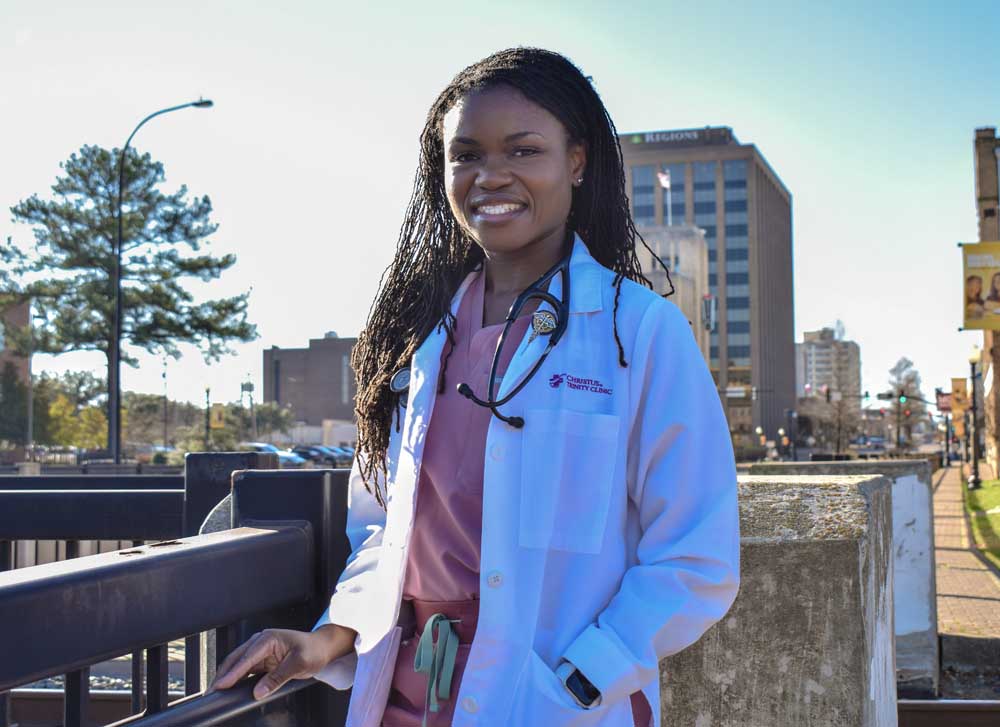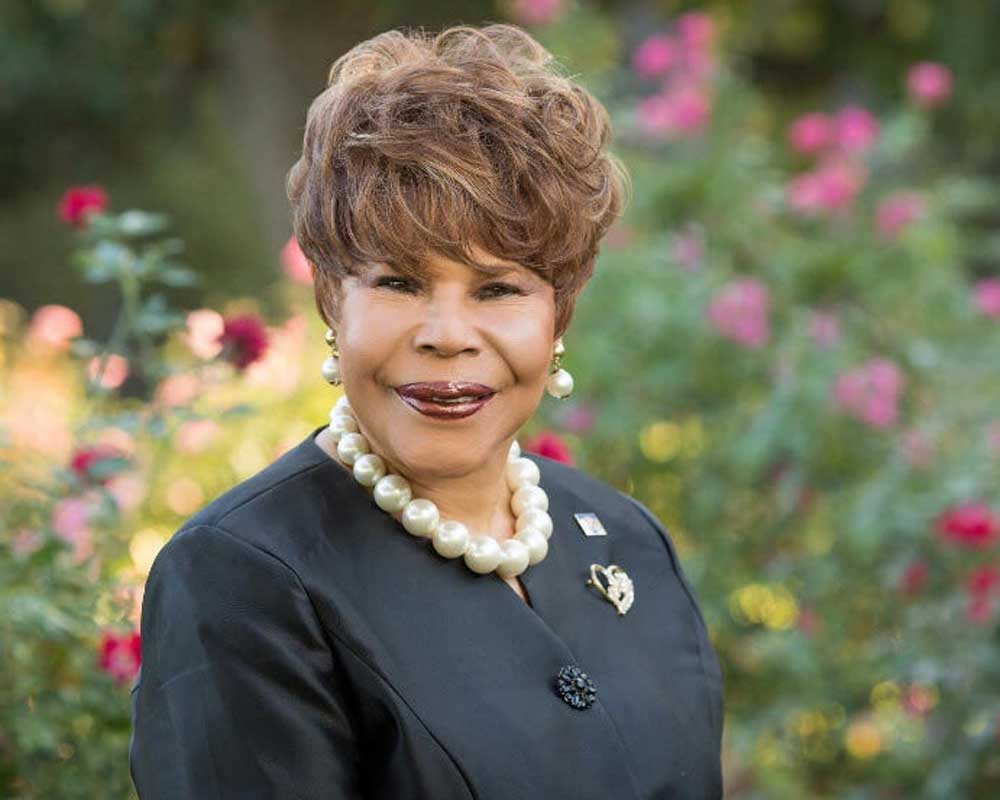Tyler fetal medicine doctor Mojirayo Sarumi wants to diversify care
Published 5:45 am Friday, February 18, 2022

- Dr. Mojirayo Sarumi, director of Christus Trinity Clinic’s Maternal and Fetal Medicine service line and a board-certified physician, is the only Black maternal and fetal medicine doctor in Tyler. “It’s not something that I’m proud of. It’s not something to highlight as a good thing at all,” she said. Sarumi emphasized the importance of providers providing medical care, to diversify that care.
Now a maternal and fetal medicine doctor, Dr. Mojirayo Sarumi was just 8 years old when her father became seriously ill. As she sat with him in the intensive care unit, her father shared a lasting message for his daughter.
“He (told me) he’s going to die and that he wanted me to be this type of person growing up. He wanted me to achieve my dreams, he encouraged me and told me I could do it and wanted me to take care of myself, be independent,” Sarumi recalled.
Trending
A month later, Sarumi’s father walked through the doors of their home. He didn’t die.
“It was at that very moment that the bulb turned on for me, that doctors can do that. He said the doctors saved (his) life and I owed them a great debt.”
Sarumi’s journey to medicine began then. She wanted to send other dads home to their daughters.
Though that interest in medicine eventually transitioned into caring for women’s pregnancies and pregnancy outcomes, today, Saumi is director of Christus Trinity Clinic’s Maternal and Fetal Medicine service line and a board-certified physician. She sends many mothers home to their families after walking alongside them when things don’t go exactly as planned.
Sarumi is the only Black maternal and fetal medicine doctor in Tyler.
“It’s not something that I’m proud of. It’s not something to highlight as a good thing at all,” she said. Sarumi explained the importance of diversifying providers in the field. “It’s not a great thing to be the only one. It’s important to get more people like me where I’m at.”
Trending
Sarumi was born and raised in Nigeria and later, she and her family came to the United States when she was a young teen. She continued her secondary education in Maryland and faced a culture shock.
“The difference is that the mindset growing up in Nigeria is such that, you are raised as an African person and you see a doctor that looks like you, your president looks like you, everyone looks like you, so there’s no doubt that you can’t achieve something,” she said. She knew then, her only barrier was opportunity and access.
This mindset, though, is what helped her trailblaze through and take those opportunities to annex the dreams she had for herself. This frame of mind also inspired her to become an advocate for diversifying medicine.
“Particularly if you have a minoritized group that’s part of the community, it’s important to have them see faces that look like them,” she said.
Sarumi said diversifying medicine and having doctors that look like every member of the community essentially helps decrease maternal mortality risk, which is her main goal in maternal and fetal medicine in East Texas.
Maternal leveling is important especially in Smith County, Sarumi said. Being that Christus offers the only Level 3 maternal care center in the region, Sarumi highlighted that women are dying during childbirth because of pregnancy-related complications increasing risk of mortality. About 700 women die in the United States every year because of those complications, according to the CDC. The CDC also reports from 2011 to 2015, Black and American Indian/Alaska Native women were about three times as likely to die from a pregnancy-related cause as white women.
“There’s this disproportionate risk to Black women. Black women are more likely to die compared to their white counterparts when it comes to pregnancy-related complications,” Sarumi said, another reason Christus works to address access to quality care.
According to the Texas Department of State Health Services, the rate of non-Hispanic Black mothers hospitalized for severe maternal morbidity in Texas continues to increase in recent years, though the rate is significantly higher than non-Hispanic white and Hispanic counterparts.
In 2011, the average rate of deliveries with complications in Texas per 10,000 delivery hospitalizations was 188.4. There were about 150 cases in non-Hispanic white deliveries, below the state average, while there were just over 200 cases in Hispanic deliveries and 266.6 cases in non-Hispanic Black deliveries.
Comparatively, in 2018 (most recent data), DSHS reported the rate slightly declined in the state average, now at 182.3, while non-Hispanic white deliveries also declined, with about 149 cases in deliveries. The rate also declined in Hispanic deliveries, too, at just under 200 cases, while the rate significantly increased in non-Hispanic Black deliveries, which are now at 299.4.
Sarumi said addressing implicit biases and systemic racism, on top of access to care, are the first steps to achieving that goal to decrease maternal morbidity in Black women as they bring forth life.
“It’s not an easy task to do,” Sarumi said. She practices an initiative called respectful maternity care, centered around the individual and addresses principals of ethics and basic human rights, such as respect, dignity, confidentiality, informed consent, the freedom to accept and obtain care without discrimination or ill treatment and the right to be able to obtain the highest standard of care.
She said she doesn’t have super powers but simply tries to embody the initiative when she encounters patients. She added being aware of our own biases and how they can impact patient care is important.
Sarumi also follows an initiative by the state of Texas called Hear Her, which ensures patients and providers are communicating appropriately and without implicit biases that diminishes what a patient reports to their doctors.
“Even with providers, knowing that African American women are more likely to die as a result of complicit biases and systemic racism, it’s important to now be heightened to what they’re saying to you, should they have any complaints in pregnancy,” said Sarumi.
Sarumi said, as it’s Black History Month, it’s a time of reflection. She reflects on those who came before her and those who opened the door for her to get to where she is, and added she is aware of the work that still needs to be done. She said she also takes this month to celebrate what it means to be Black in America.
Sarumi is a member of American College for Osteopathic Obstetrics and Gynecology along with the Society of Maternal and Fetal Medicine which have allowed her the opportunity to participate in forums addressing the issues of diversity, inclusion and health equity.
She added being part of the Christus health system allows her to see patients in the area and practice what she is passionate about. Her goal for the East Texas and Tyler community is to continue to increase the quality of care offered to women and children and to optimize perinatal outcomes. Access to quality care is also something Sarumi said is improving in the area, as going to Dallas for care is now becoming an option rather than a need.
Sarumi completed her undergraduate education at Towson University where she studied biology and chemistry and spent five years at medical school, where she graduated with her medical degree and her Master’s of Public Health, where she focused on social and behavioral sciences. She was trained at Cooper University Hospital for obstetrics and gynecology. She is a doctor of osteopathic medicine and has served Tyler for nearly three years now.
Sarumi’s motivation every day are her two children, her son Diran, 7, and daughter, Remy, 3.






